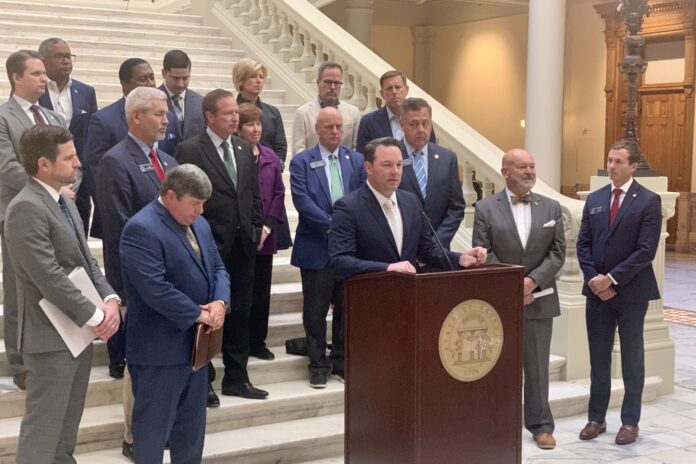
(Georgia Recorder) — A so-called ‘red tape rollback bill’ as coined by Republican Lt. Gov. Burt Jones to be a state-level version of the Elon Musk-led federal Department of Government Efficiency cleared its first legislative hurdle Wednesday despite some opposition from Democrats.
The Senate Committee on Economic Development and Tourism passed Wednesday a sweeping “Red Tape Rollback Act of 2025” that would require state agencies to review all rules and regulations every four years, calculate the economic impact of all proposals and reduce compliance and paperwork on small businesses.
The bill, sponsored by Cumming Republican Sen. Greg Dolezal, now heads to the Senate Rules Committee after advancing through the economic development committee by a 7-4 vote that fell along party lines. Senate Democrats on the committee voiced opposition because they say the bill is too broad and overly extends rulemaking powers to the legislative branch.
There was also opposition to the agency requirement to produce an economic impact analysis for any rule deemed to have more than a $1 million impact over the first five years of implementation.
The bill would allow the General Assembly to request an economic analysis of how the proposed legislation’s governmental regulations will affect small businesses. Legislative committee chairs and chamber leaders would be able to order the small business analysis for pending legislation.
If SB 28 becomes law, several dozen state government agencies would undergo a full review of their rules every four years unless they’ve reduced the number of rules by 10%. State departments and agencies are covered in the bill to justify the rules that are in place.
The legislation also allows for a legislative committee to object to a rule even when lawmakers are not in session.
Dolezal said state leaders are constantly hearing from Georgia residents about business licensing problems and other regulatory hurdles in food service and other industries that small business owners say are burdensome.
Dolezal said the bill is intended to keep any eye out for Georgia’s small businesses that employ 85% of Georgians. Under Jones’ plan to loosen regulatory constraints, the threshold for what is considered a small business in Georgia would increase from 100 to 300 employees.
Dolezal said the bill will clarify the current role that legislators have to control agency rules.
“If we’re not careful, those regulations on small businesses can make it such that business owners spend far more time complying with regulations than they do running their business,” Dolezal said at Wednesday’s committee meeting. “It places the General Assembly in the driver’s seat around rulemaking.”
There is a similar process for this four-year rule making process. The agencies are required in the bill to go through and justify the rules that are in effect and question their necessity.
Mark Woodall, Georgia legislative chair for the Sierra Club, said he’s concerned about how the proposed bill would affect environmental regulation in the state. He said of particular concern is the cost-effectiveness of requiring agencies to review every rule every four years.
He also expressed skepticism about the necessity of this frequent review, citing examples like the Clean Water Act that are federal regulations that must be enforced by the Georgia Environmental Protection Division.
Woodall said it’s important to consider the costs and benefits of regulations.
“We’ve got the Clean Water Act and the Clean Air Act,” Woodall said following Wednesday’s committee meeting. “It’s still going to be illegal to dump raw sewage in the river. So why do you have to review that every four years? I mean, if they’re not careful, they’ll wind up losing the delegation to the Georgia EPD, and then you have to go get the permit from the (U.S. Environmental Protection Agency) and I don’t think anybody wants that.”
Kennedy Atkins, government affairs manager at the George Public Policy Foundation, said that since the state began tracking regulations in 1965, the state code now contains over 18,000 regulations. He said a review of those codes found that over 15% of which were in need of review due to being out of date or for other reasons.
‘State level DOGE’
Jones has coined the bill as a state level DOGE that aims to cut harmful government regulation. DOGE is a temporary government agency formed by the new President Donald Trump administration that is designed to cut “wasteful spending,” A number of the DOGE cuts under Musk have faced criticism for overblown claims about savings and fraud in areas such as Social Security benefits.
Jones said last year that Georgia made positive changes to combat burdensome and costly regulations on behalf of workers and business owners all over Georgia. Last year, there was bipartisan support for legislation reducing some of licensing requirements for a number of jobs.
Legislators passed a bill in 2024 that eliminates barriers to employment for various jobs that require professional licenses, particularly for those with criminal backgrounds seeking jobs such as cosmetology, barbering, engineering, librarians and contractors in Georgia.
“As a business owner, continuing our efforts to promote deregulation and free our businesses from harmful government red tape will continue to be a priority,” Jones said in a statement. “Our state initiative complements DOGE, President Donald Trump’s plan to create efficiency, while paring down unnecessary spending and eliminating bureaucratic red tape at the federal level.”
Sen. Emanuel Jones, a Decatur Democrat and car dealership owner, said Wednesday that SB 28 proves that “DOGE has finally made its way to Georgia.”

Jones called out the lieutenant governor for taking the first step toward eliminating agencies and cutting the state government workforce.
“He’s usurping the power of all the agencies where now the General Assembly, the body that really wasn’t elected for those kind of responsibilities now can insert themselves in as a rulemaking body and essentially veto what any of the agencies have done,” Jones said during a press conference Wednesday.
Sandy Springs Democratic Sen. Josh McLaurin also said he’s worried about the bill essentially giving the Legislature ultimate purview over rulemaking.
“Because it’s without any specific types of rules, the general philosophy underlying a bill like this is we simply don’t trust the agencies to manage their rule portfolio well enough, and so we have to put sort of these blunt force 10% rules in place to give them any incentive to reduce the bloat.”
Sen. Frank Ginn, a Danielsville Republican, said he is supportive of the overall bill but was worried about the $1 million threshold being too low to trigger the economic analyst report.
Dolezal said he’s open to increasing the hurdle required for agencies to complete an economic impact analysis.
Dolezal said the legislation mirrors similar bills that have been passed in other states, including Florida and Kansas. Dolezal said instead of potential business owners dealing with the often confusing bureaucracy of regulations and rules, the proposed revision puts legislators in more control of the process.
“It allows business owners and executives to reach out and communicate to them on either something that has this happening or even something where they can then ask for that to be looked at specifically during the four-year review period,” he said.
Alpharetta GOP Sen. Brandon Beach, who chairs the Senate economic development committee, said the legislation is a major step toward helping small businesses.
“We talk about Delta and Home Depot and all the big companies we have here,” he said. “We’re grateful for them, but small businesses are the backbone of our economy. We need to do everything we can to roll out the red carpet and help them get their cash registers ringing.”






